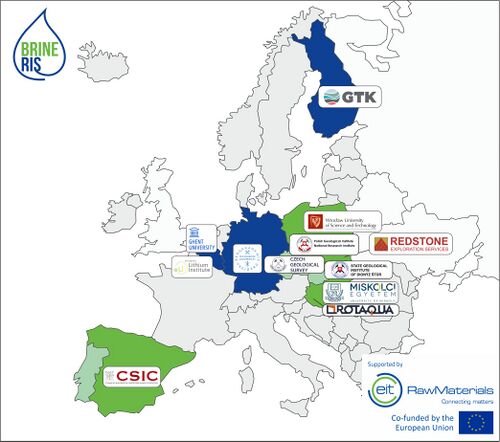| BrineRIS/Website/Project | |
|---|---|
| ID | BrineRIS/Website/Project |
| UUID | 358fb69e-3450-4936-9636-52c2ea2a693e |
| Statements (outgoing) | |
| Statements (incoming) | |
|
|
|
Description
No description found
| Item | |
|---|---|
| Type(s)/Category(s) | Item |
Introduction
Limited access to critical raw materials (CRM) is the main obstacle to developing the high-tech and battery sectors. Thanks to the striking development of efficient soluble elements recovery technologies, highly mineralized water (brine) is a potential unconventional source of metals. Usually occurring at great depths, under conditions of high pressure and hot temperatures, brines mineralized up to 300-350 g/L may contain economic concentrations of metallic elements, such as CRM from EU 2021 list (Li, Mg, Sr), Na, Ba and others. Exploring non-obvious resources, such as brines, and innovative technologies to ensure sustainable exploitation will increase the feasibility of a secured European supply of battery metals, supporting European Raw Materials Alliance (ERMA) vision “to secure access to critical and strategic raw materials, advanced materials, and processing know-how for EU Industrial Ecosystems”.
The technology needed for the recovery of metallic elements from brines is under development in a number of KAVA projects e.g., EuGeLi or Morecovery. However, the location of brines, with reliable and stable sources of metals, is still an open question. Our BrineRIS project will locate brines in Europe suitable for economically feasible metal recovery and test the emerging recovery technologies in the lab. Focusing on RIS countries of the Iberian Peninsula and Visegrad Group, in which thermal brines resources are proven, the BrineRIS project will deliver verified information on brines enriched in Li and other valuable elements. Special attention will be paid to existing mine water inflows and operating geothermal wells.
Background of the project
In September 2020 the EU released the new fourth list of critical raw materials (CRM) (Study on the EU’s list of Critical Raw Materials (2020)). It contains 30 materials among which lithium, titanium, and strontium are added to the list for the first time. The list includes the materials that are of high economic importance and present the highest supply risk for the EU.
CRMs are key to the development of the European economy in every industry at all stages of the supply chain and are irreplaceable in the development of modern and green technologies, including electronics, solar panels, wind turbines, electric vehicles, and energy-efficient lighting.
In most cases, Europe is dependent on imports of CRM from non-EU countries. As lithium (Li) is one of the CRM’s which demand still increases and is forecast to grow rapidly at least until 2030 it becomes crucial to secure sustainable production in Europe. In May 2020 the European Geothermal Energy Council (EGEC) issued a policy paper entitled “Geothermal Lithium in Europe – An industrial strategy for the geothermal lithium battery value-chain”. This was a relevant contribution to raise the awareness on the value of lithium extracted from geothermal brines. BrineRIS objectives are aligned with this potential new source for CRM recovery and will examine the potential in specific RIS countries: Poland, Czech Republic, Slovakia, Hungary, Spain, and Portugal. This encouraged the BrineRIS team to prepare this proposal filling the gap in the exploration of geothermal brines enriched in lithium and other useful elements which can be recovered as by-products.
Project objective and scope
BrineRIS intends to achieve three key objectives:
- To increase awareness of geothermal brines metallogenic potential in RIS countries by mapping brines resources and estimating the abundance of CRM and other useful elements with specific attention to lithium. This activity will cover six RIS countries – Poland, Hungary, Czech Republic, Slovakia, Spain and Portugal. Thus it will contribute to the KIC (Knowledge and Innovation Community) targets related to securing raw materials supply from within Europe and maintaining a strong EIT RM’s foothold in RIS countries.
- To build the capacity of RIS countries in low-carbon metals mining technologies related to geothermal brines by sharing experience in developing innovative recovery solutions and knowledge exchange with key players in geothermal recovery from non-RIS countries. Through the education and training of students and specialists from RIS countries, BrineRIS will increase the competitiveness and innovativeness of the RIS workforce. These activities will be directed not only to partners’ countries but also to stakeholders from other RIS regions (Baltic, Balkans, Ukraine) offering them free participation to widen the impact of the project. This objective will support the achievement of the KIC’s target in developing new tools for ethical sourcing of raw materials, as well as upskilling the workforce in the mining sector together with delivering entrepreneurship oriented young professionals to the industry and local innovation ecosystems, fully integrating the Knowledge Triangle (KT).
- To attract investors to RIS countries by developing an interactive platform of potential geothermal brines projects and preparing at least one investment case for the ERMA. That way we increase the geographical coverage of the project to worldwide stakeholders. This aim will be supported by close cooperation with the Business Advisory Board (BAB) and will contribute to the KIC’s target in establishing industry alliances as a key mechanism towards the sustainable and secure supply of raw materials. Depending on the results of the project, BrineRIS may also contribute to achieving the target related to the opening of at least one new mine in Europe by 2027.
All the objectives are strictly in line with the European policy on Raw Materials and Action Plan on Critical Raw Materials announced by the European Commission in 2020.
jsondata
| type |
| |||||
|---|---|---|---|---|---|---|
| uuid | "358fb69e-3450-4936-9636-52c2ea2a693e" | |||||
| label |
| |||||
| entry_access |
| |||||
| name | "" |
